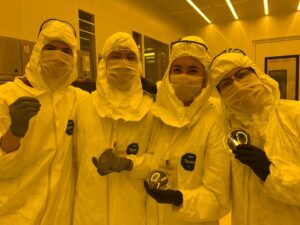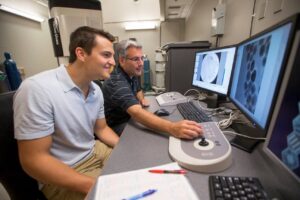Spring 2023 VINSE Short Courses – Register Now!
VINSE will offer the Atomic Force Microscopy, Electron Microscopy, and Microfluidic Device Fabrication short courses in the spring 2022 semester. Courses will be capped at 16, so don’t wait too long to register. Details and pricing can be found below!
Electron Microscopy Short Course
June 12-13
Electron microscopy is a critical component for the characterization of material and biological specimens at the nanoscale. Scanning electron microscopy (SEM) and transmission electron microscopy (TEM) both use electron beams to reveal structure, but in very different ways. Although these instruments have been made very accessible with the help of software, users must understand the mechanisms behind image formation to properly interpret their images. This two-day short course will blend accessible lectures with hands-on experience operating both the Zeiss Merlin SEM and the Tecnai Osiris advanced analytical TEM/STEM. After completing this course, users will know how best to operate both instruments to get the most information and achieve the best possible images. Specific techniques include secondary electron vs. backscattered electron imaging, bright field/dark field TEM, STEM and analytical SEM and STEM using energy dispersive spectroscopy.
Cost- $75 Vanderbilt Users; $75 External Academic and Non-Profit Users; $200 Industry and For-Profit Users
REGISTER FOR ELECTRON MICROSCOPY
Atomic Force Microscopy (AFM)
June 15-16
AFM is an advanced multi-parametric imaging technique. It delivers very high-resolution 3D images of![]() the topography of the sample. It also enables the characterization of the nano-mechanical, nano-electrical, and nano-magnetic properties of the surface. Users will learn about the theory of AFM as well as practical applications, operational tips for many of the various AFM techniques. This course covers applications of the Bruker Dimension Icon AFM for imaging in liquids to access scientifically and technologically interesting solid–liquid interfaces including biological samples. The applications will include biomolecular and biophysical measurements such as force spectroscopy and stiffness measurements. Students will learn about and use many of the ever-growing suite of AFM modes. Various case studies will be explained including those of considerable current interest such as semiconductors, 2D materials, and biomaterials. Several of the case studies will demonstrate how the use of multiple AFM modes can provide a better understanding of materials at the nanoscale than using just one mode alone. Sample preparation techniques and choosing appropriate AFM probes will be demonstrated. The course will also demonstrate the nanomanipulation and nanolithography capabilities of the Dimension Icon, including “writing” techniques in either graphical point-and-click mode, or in a recipe-driven mode in air and liquid.
the topography of the sample. It also enables the characterization of the nano-mechanical, nano-electrical, and nano-magnetic properties of the surface. Users will learn about the theory of AFM as well as practical applications, operational tips for many of the various AFM techniques. This course covers applications of the Bruker Dimension Icon AFM for imaging in liquids to access scientifically and technologically interesting solid–liquid interfaces including biological samples. The applications will include biomolecular and biophysical measurements such as force spectroscopy and stiffness measurements. Students will learn about and use many of the ever-growing suite of AFM modes. Various case studies will be explained including those of considerable current interest such as semiconductors, 2D materials, and biomaterials. Several of the case studies will demonstrate how the use of multiple AFM modes can provide a better understanding of materials at the nanoscale than using just one mode alone. Sample preparation techniques and choosing appropriate AFM probes will be demonstrated. The course will also demonstrate the nanomanipulation and nanolithography capabilities of the Dimension Icon, including “writing” techniques in either graphical point-and-click mode, or in a recipe-driven mode in air and liquid.
Cost – $50 Vanderbilt Users; $50 External Academic and Non-Profit Users; $150 Industry and For-Profit Users
REGISTER FOR ATOMIC FORCE MICROSCOPY
Microfluidic Device Fabrication
June 22-23
 Microfluidic devices can enable “labs on chips” that consume less reagents and have faster analysis times than similar experiments performed in a traditional lab environment. Applications of microfluidic devices include portable sensors for point-of-care analysis, molecular and cell biology studies, and high-throughput, multiplexed assays. This short course will introduce the techniques behind the fabrication of microfluidic devices. It will be structured to assume no prior knowledge of the technologies by the participants. It will include an overview of microfabrication and microfluidics, photolithography, soft lithography, polymers, microfluidic device design, and microfluidic device applications. Students will fabricate a PDMS-glass microfluidic device inside the VINSE cleanroom with sessions broken down into SU-8 mold fabrication, PDMS mixing and pouring, and device cutting, bonding and testing.
Microfluidic devices can enable “labs on chips” that consume less reagents and have faster analysis times than similar experiments performed in a traditional lab environment. Applications of microfluidic devices include portable sensors for point-of-care analysis, molecular and cell biology studies, and high-throughput, multiplexed assays. This short course will introduce the techniques behind the fabrication of microfluidic devices. It will be structured to assume no prior knowledge of the technologies by the participants. It will include an overview of microfabrication and microfluidics, photolithography, soft lithography, polymers, microfluidic device design, and microfluidic device applications. Students will fabricate a PDMS-glass microfluidic device inside the VINSE cleanroom with sessions broken down into SU-8 mold fabrication, PDMS mixing and pouring, and device cutting, bonding and testing.
Cost – $150 Vanderbilt Users; $150 External Academic and Non-Profit Users; $600 Industry and For-Profit Users
REGISTER FOR MICROFLUIDIC DEVICE FABRICATION

